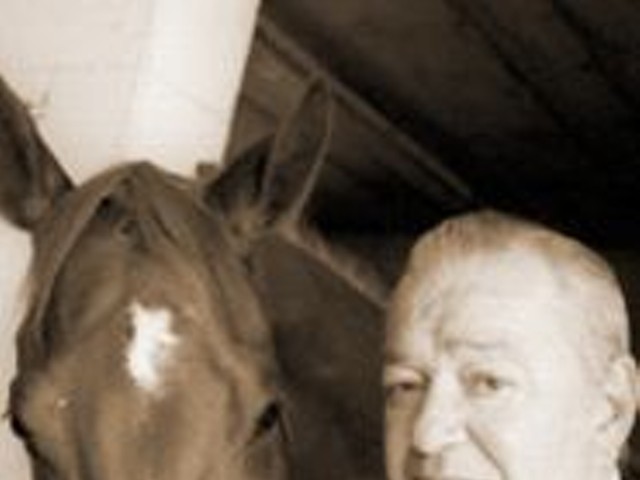"The people I was working with, I instantly didn't like them," Lehnig says. "They were different from me. When I moved from St. Louis to Columbia, I was told I was living in the wrong area, that they wanted me in a more affluent neighborhood. It was all about money, appearances and power."
Lehnig was hired in September 2001 to recruit interns and new agents from the University of Missouri's Columbia campus to work at Northwestern's John M. Qualy Agency in St. Louis. The Northwestern internship program is a well-established entry-level program, ranked a respectable 109th out of hundreds of others by the Princeton Review last year. It's a selective program, too -- according to the Review, 1,000 interns were picked from a pool of 20,000 applicants in 2001. College students and recent graduates are told they can make up to $50,000 a year selling life insurance and establish a network of important business contacts.
But Lehnig says Northwestern Mutual interns hardly ever make anywhere near that much money. Instead, she contends, many struggle for a few months, selling small policies to their friends and family members, then quit or go back to school. "You get a lot of young kids in there who are striving, trying to make a sale, any sale," she says. "The successful agents are closed-lipped about their sales, but the younger agents are failing out of the business, getting flak from the general agents. With them, it's just 'Please, God, let me get a sale.'"
The pressure, Lehnig says, often leads the newbies to pick up the sales pitches of the company's top agents, who land big commissions by selling variable life insurance policies, which couple a death benefit with a long-term investment package. But variable life insurance policies, and the sales pitches associated with them, are coming under intense scrutiny by regulators, watchdog groups and consumers. And Northwestern Mutual, one of the leading sellers of variable products and one of the top-selling insurance companies in St. Louis, is the focus of much of that attention.
The most common life-insurance policies are term-life products, which call for a set premium paid over an agreed-upon term. If a policyholder dies during the term of the policy, the insurance company pays a predetermined sum to the designated beneficiary. Variable policies offer the death benefit, but they also accumulate a cash value. In this case, the premiums -- minus administrative costs, commission fees and money set aside for the death payout -- are invested in market funds and therefore entail the same risks as any other market-related venture.
The trouble, some policy owners say, is that sales agents fail to warn them of the risks.
"We're getting a lot more complaints from people who have put their money in these kinds of instruments," confirms Randy McConnell, communication director for the Missouri Department of Insurance. "Usually the complaints are related to agent misrepresentation, where customers are led to believe there's a guaranteed rate of return."
James Zara, a St. Louis agent for Northwestern Mutual's Qualy Agency, faces a lawsuit in St. Louis Circuit Court that alleges just such misrepresentation. In the summer of 2001, Zara sold two variable policies worth more than $240,000 to Eric Ficken. In the suit, filed May 6, Ficken charges that Zara never mentioned that the increasing costs of his insurance might eventually outstrip his annual premiums. Qualy agency head John Qualy is also named as a defendant, as is Milwaukee-based Northwestern Mutual. Ficken seeks more than $2 million in damages, plus a refund of the money he paid in premiums.
The suit against Zara is one of dozens filed across the nation against Northwestern and its agents since 1999. Dan Brunette of Indianapolis, the company's top salesman for 25 years, left Northwestern last July amid a still-pending multimillion-dollar lawsuit alleging that he misrepresented the costs and risks of variable polices. The chorus of complaints against the company prompted a dozen former policyholders to found a Web site, www.nmlcomplaints.com, which tracks news stories, lawsuits and general gripes involving Northwestern Mutual.
The company settled a complaint against Zara last summer, in arbitration with the National Association of Securities Dealers. A client contacted NASD about a life-insurance policy purchased as a college-savings plan, claiming that Zara misleadingly compared variable insurance to other investments and that he did not disclose all the fees associated with the policy. NASD only makes available a summary of the case, which shows that Northwestern Mutual reached a settlement with the client for $24,054 -- not quite the full sum of the original $26,000 investment. (Zara did not respond to a request for an interview for this story.)
Implicit in the litany of complaints is the suggestion that the company itself turns a blind eye to or encourages sales techniques that don't fully disclose the costs and risks of variable insurance. According to nmlcomplaints.com, the NASD is conducting an investigation of Northwestern Mutual. An NASD spokesman says he cannot confirm or deny the existence of a probe. John Qualy did not respond to requests for an interview. Ed Hempstead, head of Northwestern Mutual's other local agency, referred questions to the company's attorney in Milwaukee, who did not return several calls requesting comment.
"From a national point of view, there's no doubt they were promoting this and definitely looking the other way when people were manipulating their presentations," says a former Northwestern agent who worked for the company here in the mid-1990s. "I was there from 1992 to 1995, and I was already being told then that there were people in trouble for unethical behavior." The former agent, who spoke on the condition that his name not be published, worked at Ed Hempstead's agency, where, he says, staffers were discouraged from engaging in such practices. But he says he saw enough of the company's promotional material to know the techniques were common.
The company's top agents hold regular seminars on sales techniques. The seminars cost thousands of dollars, and agents are often required to pay the fees themselves. The former Hempstead agent says unofficial sales material from top agents floated around his office with tips on how to make big sales to reluctant clients, but Hempstead kept a close eye on it and told his agents not to use it.
"I had something that I'd printed up off some software, and Ed Hempstead came by and said, 'I hear you have something printed out,'" the ex-agent recounts. "He said, 'I tell you what. Don't use it.' Hempstead was really clamping down, but it was going on all through Northwestern Mutual."
Others say the complaints about Northwestern are exaggerated. Another former Hempstead agent says some people blame their agents when their investments don't grow as quickly as they'd like. He left the business recently because, he says, "the prospecting part of it's not for me, long-term.
"It's one of those businesses where two people look at it and see totally different things," the recently departed agent says. "To some people it's dishonest. To others it's aggressive sales techniques. I don't think it's a Northwestern thing. It might be an industry thing."
Mark Lucius, director of corporate information at Northwestern Mutual, dismisses the flurry of attention and the pending legal actions. "The Web site purports to be a consumer organization," Lucius says. "It is, in fact, devoted to one purpose, and that's to foment lawsuits."
Nick, who spoke on the condition that his last name not be used in this story, was hired by the Qualy agency last May. He immediately passed his certification to sell insurance but had to wait until August, when the rest of the new hires were all certified, to begin training. He says the unpaid three months was a strain, but he walked out of the office after the first day of training and never went back. Training, he says, consisted of the new agents' listing the names and contact information of 200 friends and family members and rehearsing a scripted sales pitch for variable insurance.
"I felt, at the end of that day, like I'd been so screwed for three months," says Nick, who now works as a financial planner at a brokerage firm. "There's no way I could make that pitch to somebody and take their money. I have a conscience. I don't think I could sleep at night."
Julie Lehnig also left, after ten months. She's now doing freelance work. "It was good real-world experience," Lehnig says in retrospect. "I left WorldCom to go to Northwestern, so I probably wouldn't have had a job anyway. When I left that job, my mom was so happy because I'd been so miserable."





